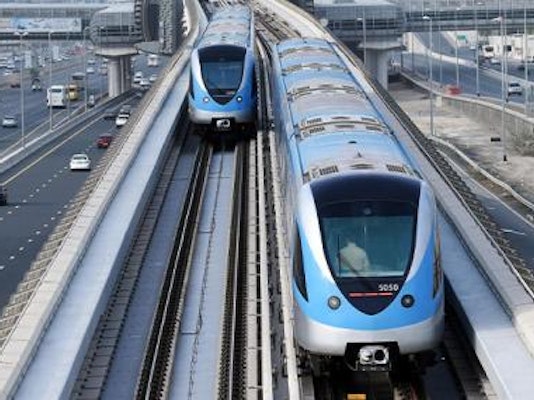Following Dubai’s Roads & Transport Authority (RTA) announcement on 20 March 2021, Keolis is honoured that the company and its international partners were the successful bidders for a 9-year contract, with a possible 6-year extension and worth approximately 125 million euros per year, to operate and maintain the city’s world class metro and tram networks. The new contract provides a perfect opportunity to blend the RTA’s reputation for innovation and efficiency with Keolis’ international experience and expertise. Keolis will be the lead partner in a joint venture (JV)2, which will also deliver the talents of both Mitsubishi Heavy Industries Engineering (MHI) and Mitsubishi Corporation (MC).


A MODERN, INNOVATIVE PUBLIC TRANSPORT NETWORK AT THE FOREFRONT OF SMART MOBILITY
Underpinning Dubai’s Smart City vision, innovation is a key feature of RTA’s metro and tram networks, which carry around 210 million passengers per year.
Harnessing modern level 4 communications-based train control (CBTC) technology, provided by Thales – which increases transport capacity by reducing the time interval between trains - the Dubai metro network is the longest fully driverless and automated metro network in the world. It features two lines (including Route 2020) spanning a total of 90 kilometers, including 15.8 km of tunnel, and 53 fully air-conditioned stations offering a host of facilities ranging from retail outlets to Wi-Fi. The metro system is embedded into a wider, multimodal network offering comprehensive and accessible travel options, which link metro stations with bus, taxi and marine services.
Equipped with 129 metro trainsets (79 Kinki Sharyo metro trains delivered by Mitsubishi in 2009 and 50 Metropolis trains built by Alstom), the metro network provides easy access to key locations such as Dubai International Airport, Burj Khalifa, Dubai Healthcare City and the Expo 2020 site, where the United Arab Emirates is set to host an exceptional edition of the World Expo event for six months from October 2021.
The city’s catenary-free tram network, which opened in 2014, harnesses an APS ground-level power supply system, offering passengers a convenient and comfortable travel option and without overhead catenary wires, provides great opportunities to view Dubai’s magnificent urban landscape.
With a total length of 10.6 km, the city’s tram network consists of 11 stations and 11 Alstom Citadis trams, connecting to two metro stations: Dubai Marina and Jumeirah Lake Towers. The tram network is equipped with cutting-edge innovations such as platform screen doors.
A MODERN, INNOVATIVE PUBLIC TRANSPORT NETWORK AT THE FOREFRONT OF SMART MOBILITY
Underpinning Dubai’s Smart City vision, innovation is a key feature of RTA’s metro and tram networks, which carry around 210 million passengers per year.
Harnessing modern level 4 communications-based train control (CBTC) technology, provided by Thales – which increases transport capacity by reducing the time interval between trains - the Dubai metro network is the longest fully driverless and automated metro network in the world. It features two lines (including Route 2020) spanning a total of 90 kilometers, including 15.8 km of tunnel, and 53 fully air-conditioned stations offering a host of facilities ranging from retail outlets to Wi-Fi. The metro system is embedded into a wider, multimodal network offering comprehensive and accessible travel options, which link metro stations with bus, taxi and marine services.
Equipped with 129 metro trainsets (79 Kinki Sharyo metro trains delivered by Mitsubishi in 2009 and 50 Metropolis trains built by Alstom), the metro network provides easy access to key locations such as Dubai International Airport, Burj Khalifa, Dubai Healthcare City and the Expo 2020 site, where the United Arab Emirates is set to host an exceptional edition of the World Expo event for six months from October 2021.
The city’s catenary-free tram network, which opened in 2014, harnesses an APS ground-level power supply system, offering passengers a convenient and comfortable travel option and without overhead catenary wires, provides great opportunities to view Dubai’s magnificent urban landscape.
With a total length of 10.6 km, the city’s tram network consists of 11 stations and 11 Alstom Citadis trams, connecting to two metro stations: Dubai Marina and Jumeirah Lake Towers. The tram network is equipped with cutting-edge innovations such as platform screen doors.
A UNIQUE ALLIANCE THAT WILL ENHANCE THE PASSENGER EXPERIENCE
From September 2021, Keolis will provide shared mobility services in Dubai along with the major railway system integrator MHI and rolling stock supplier MC, partners which were both heavily involved in the construction and development of Dubai’s metro network. With Keolis in the lead, the JV will take the form of a new subsidiary called Keolis-MHI.
This JV combines MHI and MC’s extensive knowledge of the Dubai’s metro network with Keolis’ experience in automated metro operations. The JV will work hand-in-hand with RTA to deliver its vision of world-class, smart and sustainable mobility for the city. Keolis-MHI will:
Welcome and train around 2,000 staff members in the “Zero Harm” safety culture and “Thinking Like a Passenger” approach, which ensures that safety and passenger satisfaction are placed at the heart of its operations.
Develop local communities’ expertise and talent by employing Emiratis and working with local businesses.
Enhance the multi-modal journey experience with innovations in real-time passenger information and optimized timetables.
Manage and improve rolling stock and infrastructure asset life cycle, through predictive maintenance and data-led processes, digitalisation and visualisation.
Continue to support and exchange knowledge and best practice through a community of thousands of rail experts working across 9 metro and 26 tram networks.

